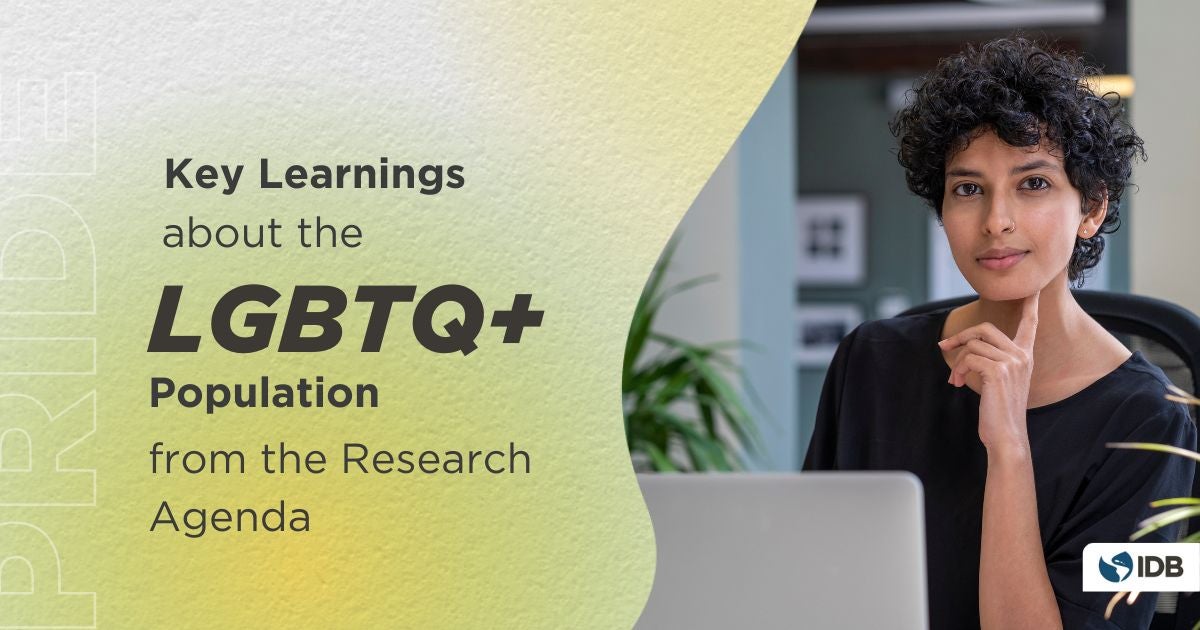Evidence is fundamental to inform and guide public policies. As we mentioned in another blog post, access to high-quality data and knowledge is as important for societies as medical exams are for individuals’ health. They allow us to identify problems that are often invisible to the naked eye, their underlying causes, and possible solutions.
Unfortunately, data and rigorous evidence about diverse populations are limited in Latin America and the Caribbean. In the specific case of LGBTQ+ individuals, we do not know the size of this population in most countries. Therefore, we also lack representative data diagnoses that account for existing socioeconomic gaps.
Advancements in closing knowledge gaps
The good news is that these knowledge gaps are gradually being filled. During 2021-2022, the IDB funded the development of seven quantitative studies that spearhead the research agenda on the situation of the LGBTQ+ community in the region, addressing issues of measurement and the extent of discrimination in different spheres of their lives. A new issue of the GDLab Policy Brief series, the Gender and Diversity Knowledge Initiative of the IDB Group, offers a comprehensive review of the main findings and policy implications derived from these studies.
In this blog post, we will share 3 key learnings extracted from some of these studies.
1. Challenges go beyond including questions in surveys
Some countries in the region have taken significant steps to ensure statistical visibility by incorporating questions about sexual orientation and gender identity in nationally representative surveys. However, including questions on these topics is only the first part of the equation. An important consideration is the design of measurement strategies that are effective in mitigating social desirability biases caused by fear of stigma and discrimination.
As shown in a study conducted in Bogota, increasing the perception of anonymity and privacy when asking questions about sexual orientation and gender identity could increase self-identification of LGBTQ+ individuals. Related to this, a recent experimental study in Mexico found that findings regarding the size of the population self-identifying as LGBTQ+ and the sentiment of rejection towards individuals with diverse sexual orientations and gender identities can vary greatly depending on the age of the respondents, despite not finding significant differences in self-identification within the context of this study.
2. Stereotypes affect public opinion
Public opinion towards LGBTQ+ individuals has significantly improved in recent decades, particularly in countries with legal reforms protecting the rights of this population. However, legal reforms alone are not enough to eradicate stigmatization and prejudice against LGBTQ+ individuals.
Changing the attitudes and beliefs underlying these behaviors requires deeper transformations, including how LGBTQ+ individuals are represented in mass media. In the case of telenovelas (or soap operas) specifically, a study across fourteen countries in the region reveals that the stereotypical representation of LGBTQ+ individuals (primarily in comedies) may be associated with lower tolerance from the audience towards these individuals, at least in the short term. This study suggests the need to rethink the way stereotypes are used when representing LGBTQ+ individuals.
3. Discrimination extends to the families of LGBTQ+ individuals
Discrimination not only directly affects LGBTQ+ individuals but also has repercussions on the well-being of their families. In the educational field, for example, a field experiment conducted in Colombia provides evidence of the barriers faced by children of same-sex couples when it comes to enrolling their children in schools.
Another study conducted in four countries in the region reveals that heterosexual couples composed of a trans woman face discriminatory treatment in the rental housing market. Specifically, the results show that these couples receive fewer responses and fewer invitations to visit properties of their interest. Discrimination decreases for couples with a good economic situation.
How can we make progress?
These studies contribute to the knowledge about the situation of LGBTQ+ individuals in the region. However, there is still a long way to go. The production of more data and the development of rigorous studies on this population are essential to inform the design of more inclusive policies in the region. It is also crucial to foster more spaces for academic debate that support and expand this research agenda. Additionally, strengthening dialogue and exchange between policymakers, think tanks, academia, and civil society organizations is fundamental.
Disseminating the evidence
At the IDB, we have taken firm steps to disseminate the existing evidence. For example, in 2022, the IDB Research Department and the GDLab organized the first session on LGBTQ+ issues in the history of the Annual Meeting of the Latin American and Caribbean Economics Association (LACEA), where the results of three studies funded and published with the support of the IDB were presented.
Three of these studies were presented at a live event organized by the IDB as part of the International Day Against Homophobia, Transphobia, and Biphobia. This event was part of a coordinated campaign with the World Bank, the Asian Development Bank, and the European Bank for Reconstruction and Development to raise visibility and generate discussions around the barriers faced by LGBTQ+ individuals. You can watch the recording of the event in Spanish in the video below:



Leave a Reply